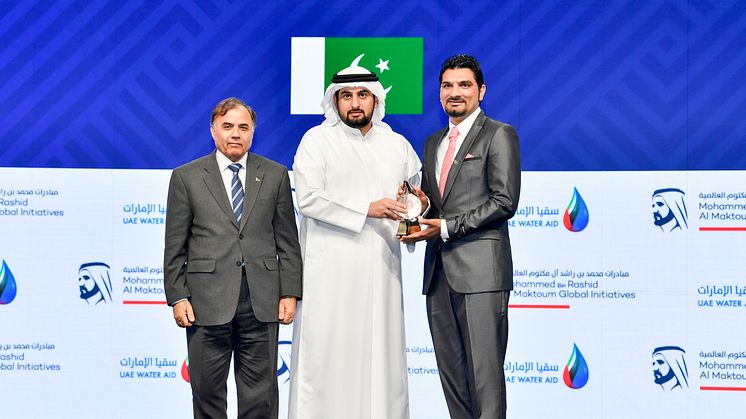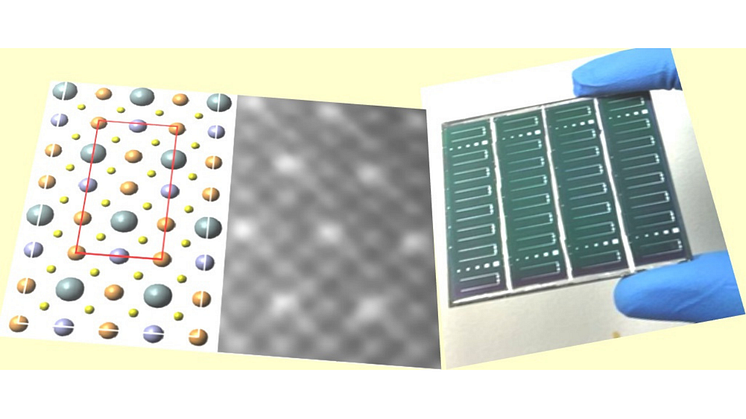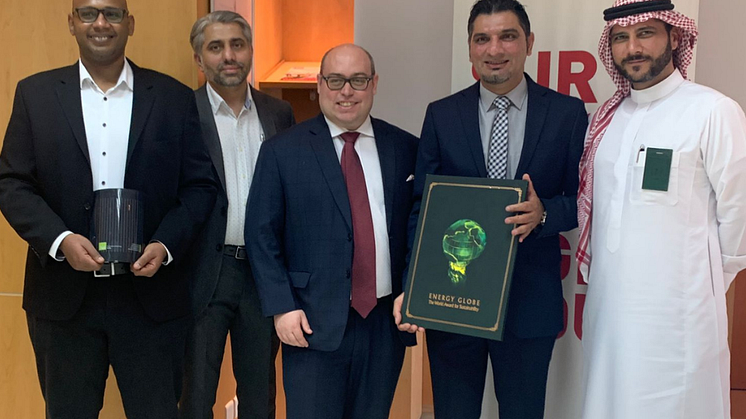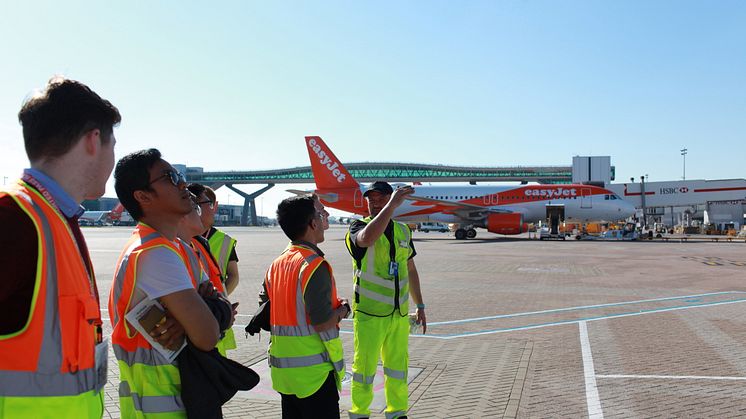
Press release -
Unlocking desalination with solar energy
A mechanical engineer from Northumbria University has won a prestigious award after developing an innovative process to turn sea water into clean, safe drinking water, using solar energy.
Dr Muhammad Wakil Shahzad was named winner of the Global Water Award 2020 (Innovative Individual Award for Youth) at the ‘His Highness Mohammed bin Rashid Al Maktoum Global Water Award’ in Dubai for his 24/7 Solar Desalination project.
The Award was established by HH Sheikh Mohammed bin Rashid Al Maktoum to encourage research institutions, individuals, and innovators from around the world to develop sustainable and innovative solutions to water scarcity, using solar power.
This year marked the second year the awards have taken place, with the ceremony held in Dubai on 29 January.
With limited rainfall, most Middle East countries heavily rely on desalination processes – which involves removing salt from sea water to produce safe drinking water.
Conventional desalination processes are not only energy intensive but also have a negative impact on the environment.
The energy used during desalination is produced using fossil fuels such as oil and gas, which result in environmental emissions.
In addition, the pre-treatment chemicals used during the process are rejected back into the sea with concentrated brine that affects marine life.
Dr Shahzad, of Northumbria University’s Department of Mechanical and Construction Engineering, was recognised during this year’s awards for his work in developing an innovative process which combines two desalination techniques to overcome current operational limitations.
This has resulted in almost double the water production, low environmental emissions and chemical rejection, and higher efficiency, compared to conventional desalination techniques.
His 24/7 Solar Desalination project is a hybridization of the conventional multi-effect distillation (MED) system and a new process known as adsorption desalination (AD).
The new hybrid system, known as the MEDAD cycle, is powered by solar energy and cuts CO2 emissions by half compared to the conventional desalination process.
Speaking about his research, Dr Shahzad said: “The process of desalination has been around for hundreds of years, ever since it was used on board long sea voyages as a way of providing fresh drinking water.
“However, the desalination process has changed very little in the last 30 years. The most common methods used are thermally driven, where seawater is evaporated and condensed as pure water, and pressure driven membrane systems.
“Both processes have only achieved a performance level of 10-13% since the 1980s when they started to be used commercially in the Middle East.
“The hybrid MEDAD system can achieve a performance ratio of over 25% the thermodynamic limit – one of the best performances reported up-till now.
“It utilizes low temperature thermal heat from 60-65°C to desalinate the water, which can be easily achieved from solar, industrial waste heat or geothermal.
“We have seen excellent results as this hybrid system not only lowers the cost of water production but also reduces carbon emissions and chemical injection by more than half.”
The new hybrid system has been piloted at the National University of Singapore and King Abdullah University of Science, Saudi Arabia.
The latter is operating with 350m2 evacuated tube solar thermal collectors and is producing 10,000 litres of fresh water a day from the Red Sea. It has been successfully commercialized in Saudi Arabia.
Dr Shahzad believes the new system has the potential to be used in counties all over the world where fresh water is scarce.
He said: “Transferring the conventional processes to this hybrid solar desalination system to produce fresh water is essential to help countries achieve zero carbon emissions.
“I strongly believe this technology is a game changer and am very honoured to have been recognised with this global innovation award.
“Winning doesn’t always mean being first, winning means you are doing better than you have done before.”
The UAE’s leadership has launched various platforms to showcase desalination innovations from all around the world.
The HH Mohammed bin Rashid Al Maktoum Global Water Award is one of a number of measures to encourage innovations in renewable technologies within the desalination industry, and recognise the people and organisations leading the way in this field. It aims to unite all innovators towards one mission – combatting global water scarcity.
His Highness Sheikh Hamdan bin Zayed Al Nahyan said: “Climate change has increased the scarcity of clean water. Therefore, The Mohammed bin Rashid Al Maktoum Global Water Award will save millions facing death due to water scarcity.
“The award aims to find solutions, through its pillars, and encourage sustainable solutions to counter water scarcity around the world using solar energy and modern technologies.”
Alongside his research and teaching at Northumbria University Dr Shahzad is also a coordinator for the International Desalination Association’s Young Leader’s Programme for the Middle East region. He has thanked Professor Kim Choon Ng for his support and KAUST for research funding for his pilot demonstration.
Find out more about Mechanical and Construction Engineering at Northumbria University.
Topics
Categories
Notes to editors
Northumbria is a research-rich, business-focused, professional university with a global reputation for academic excellence. To find out more about our courses go to www.northumbria.ac.uk
TV and radio facilities at Northumbria University
Northumbria University’s academic experts are available for interview via our broadcast provider Globelynx, a down-the-line broadcast quality TV facility at our Newcastle campus.
You can book to use the Globelynx facilities direct by logging into www.globelynx.com. The IFB number is 0191 603 1630.
To request and check the availability of our experts or for any other media enquiries please contact our Media and Communications team on +44 (0)191 227 4604 or email media.communications@northumbria.ac.uk.












